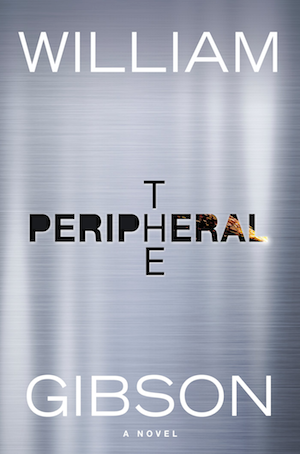Practical Time Travel

I just finished reading William Gibson’s The Peripheral for the second time, and I recommend you do too: Read it twice, I mean.

Gibson’s always written densely; idiomatic, with good flow, but it’s really packed in. I remember decades ago, talking over the Sprawl books with my brother: “Early on,” he said, “you have no idea what’s going on.” What with that, and beauty of the words, and the interesting people in the stories, and the big set-pieces… well, I’ve never read any Gibson just once.
But I left out the biggest deal with his books: the backgrounds, the flavors, the astonishing skill at mise en scène. You are there in a Rasta-flavored orbital rocket, or postmodern Tokyo rock-star bar, or hand-crafted (by Arabs) robotic limousine. Or just, as here, in a low-rent Red-state town in a not-too-distant highly-foreseeable future, dealing with the impact of one time intersecting another.
More on that later; But did I say the writing is dense? This is maybe Gibson’s thickest. On my first pass, I was working hard on some other stuff and picking up The Peripheral late and tired; and it wasn’t so much that I was losing threads as failing to gather them. So I read it again, and it made ever so much more sense. And I enjoyed both trips through, a whole lot.
What’s good · Well, the niftiest dodge ever around time-travel’s paradoxes. And the raw contrast between the two futures: Because the other isn’t like that Red-state hick town at all.
The male lead, Netherton, is really good; his struggle with alcohol is a sobering (ha-ha) counterpoint to his dance with the powers using him as a minor weapon in a big strange conflict.
And the very-early sequence with the “patchers”; it has that genuine deep-strangeness, that explosion of brain flavors that keeps some of us going back to sci-fi. I sort of wish there’d been a bit more of them. But wow.
Well and of course all the nifty and highly plausible future tech that ties everything together, starting with the time-travel.
What’s lame · Well, maybe I failed twice to gather the threads; but there are still parts of the story that don’t make any sense. The all-powerful police boss Lowbeer doesn’t seem to have any visible staff; and at the end of the day, why did they need to bring in trans-temporal telepresences for ninja duty, couldn’t they have just used their regular security guys who had, you know, experience using peripherals? And give me a break, at Daedra’s big party, she’s gonna let the guests’ ninjas accompany them when there’s murder on multiple agendas? Particularly in a mode where they can live through being suicide bombers?!
Our heroine Flynne is likeable and plucky but at the end of the day not that interesting; couldn’t she have had a little twist here or there? But the everywoman narrator, engulfed in weirdness, is as old as the hills in sci-fi; and it actually works pretty well as a storytelling mechanic.
And Lev’s pet geek Ash didn’t work for me at all; she wears weird clothes and irritates people, but I think she could have been subtracted from the book without loss of value.
The good bits · I’ve pulled together a few, just for fun.
And this other evening light, rainy, rose and silver, and to her left a river the color of cold lead. Dark tumble of city, towers in the distance, few lights.
…their exposed flesh marked not with tattoos but intricately meaningless patterns expressed in pseudo-icthyotic scaling.
His eyes, set on the corners of his vast, entirely inhuman head, looked like something a child had scribbled, then erased.
She first noticed it, as she passed the twenty-third. A dry gray, against the wet dark metal. Color of dead skin pulled from a blister. Size of a child’s backpack.
“Thank you,” Flynne said, and let her head down on the pillow, timesick, or maybe that and that texture thing, her old chambray pillowcase intricate as chess against her face, less familiar.
“We may be able to change that.” “Lowbeer knows how to fix history?” “It isn’t history yet, here…”
Anyhow, if you like Gibson you’ll like this. It might even be a good Gibson for the first-timer to start with.
Comment feed for ongoing:
From: Sam MacCutchan (Nov 28 2014, at 06:45)
I've always been a big fan of William Gibson I'm looking forward to reading this book. I still have to read the Pattern Recognition/Spook Country/Zero History trilogy.
I noticed the h is missing in http at the beginning of your link to the book on Amazon.
[link]
From: Nick Johnson (Nov 28 2014, at 09:06)
I haven't read much Gibson, but for one reason or another I'd preordered this one.
I tried to read it, I really did. But he seems to take a perverse pleasure in being obscure; in writing stuff that's hard to follow and understand. I gave up about 15% of the way in, still having little more idea about what was going on than when I began.
[link]
From: Gavin B. (Nov 29 2014, at 00:19)
Quote:
William Gibson: how I wrote Neuromancer
Gibson ‘had so very little idea of how to write a novel’ when he was commissioned to come up with a manuscript ...
http://www.theguardian.com/books/2014/nov/26/william-gibson-neuromancer-book-club
[link]
From: Wayne Citrin (Dec 07 2014, at 12:15)
Regarding the dodge to avoid time travel paradoxes, Michael Crichton tried a similar dodge in Timeline, but less successfully and in a far inferior book.
Regarding the best Gibson entry book, opinions may differ, but I'd recommend Pattern Recognition, followed by the rest of the Blue Ant/Bigend trilogy. While initial reader disorientation is a Gibson trademark (and he's talked about this in interviews), I'd say the disorientation in The Peripheral is a bit excessive for a first-time reader.
[link]